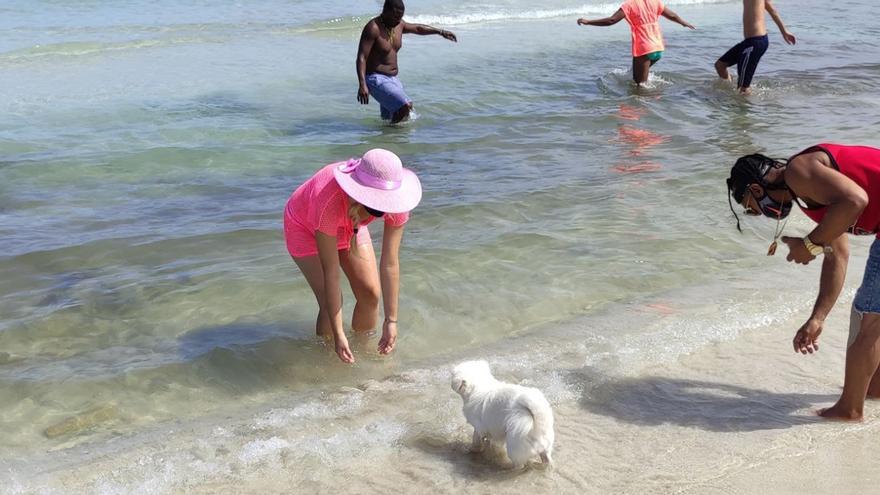
![]() Juan Diego Rodríguez, 14ymedio, Havana, 22 September 2023 – Among the new measures dictated by the Havana government on hygiene and community services, one in particular has caused special irritation. It’s the one which prohibits pets or farm animals from the beach, similar to their prohibition from cemeteries or rubbish dumps, which can entail, according to the resolution which came into force on Wednesday, a fine of between 1,500 and 2,000 pesos.
Juan Diego Rodríguez, 14ymedio, Havana, 22 September 2023 – Among the new measures dictated by the Havana government on hygiene and community services, one in particular has caused special irritation. It’s the one which prohibits pets or farm animals from the beach, similar to their prohibition from cemeteries or rubbish dumps, which can entail, according to the resolution which came into force on Wednesday, a fine of between 1,500 and 2,000 pesos.
The Cuban Association for the Defence of Animals (Ceda) declared its “complete disagreement” with the article in a posting on its social media pages, as, they argue, it goes against the law’s Animal Wefare Decree. This states expressely that “pet owners should clear up their pet’s waste”, they explain in their text, where they propose that, “there can be beaches where pets are not allowed, or months of the year when they’re not allowed, or hours during the day. But it’s not acceptable to ban pets from areas where the families of their owners go to relax”.
Ceda also says that “thanks to the fact that there are people who look after the animals’ health and sustenance”, any animals that were in these locations, for example in cemeteries”, are not any “danger to society, and actually enhance the place because they enhance the sense of security, create a space that is more amenable for people and prevent us from becoming somewhat sterile beings”.
“We won’t accept that those who look after the few animals that actually cause no higiene problem are to penalised”
In Cuba there are “millions of street animals”, the association concludes: “We won’t accept that those who look after the few animals that actually cause no higiene problem are to penalised, especially when there are no refuges nor any government solutions for mitigating the plight of so many other animals that are suffering and in critical conditions on the streets”.
Another animal activist, known on social media as Filoxiraptor, argued that: “The animals don’t mess up the beaches or their adjoining areas and I’ve never seen the authorities impose fines for non-compliance of this measure for native and legal people”.
He added also that if there are “community animals” (on the streets) it is through “their being abandoned and there being a lack of awareness about it in the country”, and that, also, “the majority of vets, because of the lack of resources, recommend actually taking them to the beach, to heal their skin problems, tone their muscles and rehabilitate them”.
When 14ymedio visited the three beaches of Santa Maria, Mar Azul and Megano – to the east of the capital – on Friday, they found no pets there. However, it wasn’t because they’d started to rigorously enforce the new law, rather it was simply because that’s how it normally is.
“It’s not usual to bring animals, because most people come by public transport, where they’re prohibited”, explained a bather, who told us he left his two dogs at home in Central Havana, but that he doesn’t agree with the new ruling. “It’ll be because of the mess that the animals leave everywhere”: he indicates with irony the mountain of empty drinks cans discarded on the sand: “Yeah, all the dogs left all these here, sure they did”.
“There’s no need to worry if there are no police about, just imagine the inspectors”, the lifesaver reasoned
Furthermore, when asked about the new law, a lifeguard suggested that there would be no problem bringing pets to the beach. “There’s no need to worry if there are no police about, just imagine the inspectors”, the man reasoned.
The article referring to pets is not the only one that has awakened discontent: the ruling also includes fines of 2,000 to 3,000 pesos for anyone not putting their rubbish into the bins in time. Comments on the official site Cubadebate demonstrate this.
“These measures are very good and I’m glad they’ve introduced them but I want them to tell me where I’m to put my rubbish when all the bins are full, because as far as I know the rubbish collectors don’t come by every day and the bins fill up in less than a day”, says one poster named Daniel. In the same way, Besteiro says: ” In my neighbourhood (EMBIL, Boyeros) it’s common for ten days or more to go by before they collect the rubbish, and with the container full where are you supposed to put yours?”
He asks himself: “What do they do with those who steal the wheels off the rubbish bins and later make handcarts with them and push them past the police? What do they do with the community workers who pull the bins off the wagons and, despite being new, break them?”
“Only mobilize the people’s awareness? And what about the others? The obligation of the Comunales as public servants and cause of this disaster, does that not count?” asks commentator Paloma, who lists: giant rubbish dumps, blocked drains, long-standing leaks, unswept streets, sewage spills, overgrown weeds, pavements destroyed by rubbish collectimg trucks, indifferent employees who mistreat the bins and leave the streets full of rubbish, and much more, has nothing to do with people’s awareness.”
Translated by Ricardo Recluso
____________
COLLABORATE WITH OUR WORK: The 14ymedio team is committed to practicing serious journalism that reflects Cuba’s reality in all its depth. Thank you for joining us on this long journey. We invite you to continue supporting us by becoming a member of 14ymedio now. Together we can continue transforming journalism in Cuba.
